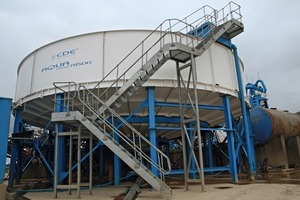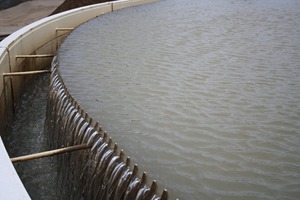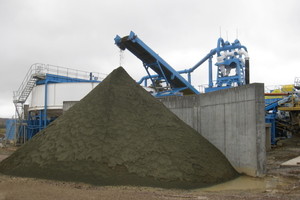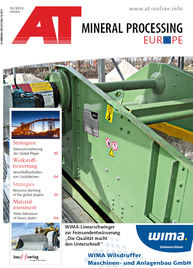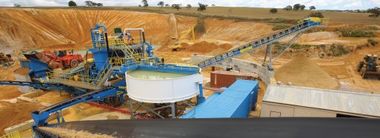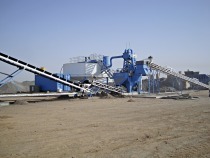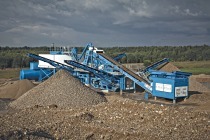Surplus with a wash plant upgrade
An upgrade of the existing washing plant at the Drapers-
town Quarry operated by Creagh Concrete has released 4 million tonnes of material and extended the life of the quarry by 10 years.
Creagh Concrete is the largest land based sand and gravel producer in Northern Ireland. The sand and aggregates they produce at various locations are used in the production of a range of pre-cast products as well as ready mix concrete. “We currently produce 500 000 tonnes of material per year with 75 % used internally and the remaining 25 % being sold to the local market” explains Willie Doherty, Divisional Director at Creagh Concrete.
The upgrade to the existing CDE washing plant was required as a result of a band of extremely difficult material being exposed near the floor of the pit. This material was not able to be processed effectively through the existing crushing, screening and washing plant due to high levels of plastic clay. “Using our existing processing system we were not able to extract any value from the raw material” says Colm Scullion, Quarry Manager at Creagh Concrete. “The absence of a suitable attrition system within the existing plant needed to be addressed and it was at this point that we engaged with CDE to provide a tailored solution.” Detailed discussions with the CDE Project Design team followed and the outcome was agreement on a two-stage upgrade to the existing plant. The first stage involved an upgrade of the existing water treatment and recycling system. This saw the replacement of the existing Aquacycle A400 thickener with the Aquacycle A1500.
The AquaCycle A1500 at Draperstown Quarry represents the first global installation for the new thickener which was designed specifically for this application (Fig. 1). Unlike many other instances where the AquaCycle thickener has been specified the driver was not an issue with water supply but rather an example of how environmental considerations are at the centre of the decision making process for Creagh Concrete (Fig. 2). Once the water treatment upgrade had been completed, stage two of the plant upgrade was initiated. This involved the introduction of the AggMax portable logwasher and an EvoWash sand washing plant. The AggMax incorporates a Grizzly screen, RotoMax RX150S logwasher and Evoscreen dewatering screen on a single chassis.
The new plant accepts minus 75 mm as-dug material which has been pre-screened at the face. The plus 75 mm material is subsequently processed through an existing jaw crusher. “One of the keys to success for the new plant was delivering the material to our plant freshly dug” explains Paul O’Neill, CDE Project Manager on this installation. “Our experience with heavily claybound material suggests that if it is stockpiled and exposed to rain it becomes almost impossible to handle.”
The minus 75 mm material is delivered to a feed hopper and transferred to the Aggmax where the grizzly screen removes any remaining oversize material. After entering the Rotomax the feed material is then subjected to extreme attrition which breaks down the clay. The 5 mm to 75 mm material is then dewatered while the 0-5 mm material is sent to the Evowash sand washing plant. The 5 mm to 75 mm material is then conveyed to the existing dry screening plant and classified into the various aggregate grades required by Creagh Concrete within their own pre-cast and ready mix concrete manufacturing operations.
The new plant operates at between 100 t/h and 150 t/h as a result of the variation in the feed material. As Paul O’Neill explains: “Where the feed contains a larger proportion of minus 5mm material the feed capacity is reduced while a larger proportion of 5 mm to 75 mm aggregate material allows for an increased feed rate. Based on extensive material testing the reserve is made up of approximately 30 % silts and clay and an equal split of sand and aggregate material.”
Following successful completion of the two stage plant upgrade Creagh Concrete can continue to produce a wide range of sand and aggregate products from the Draperstown quarry for the foreseeable future (Fig. 3). Before the new plant was installed Creagh Concrete were faced with a reserve that had cost £ 1 per tonne of material processed based on the purchase price for the quarry in 1991. The introduction of the new plant has reduced this to £ 0.25 per tonne. “This makes the wash plant upgrade one of the best investments we have ever made” concludes Gerard McKeague.

